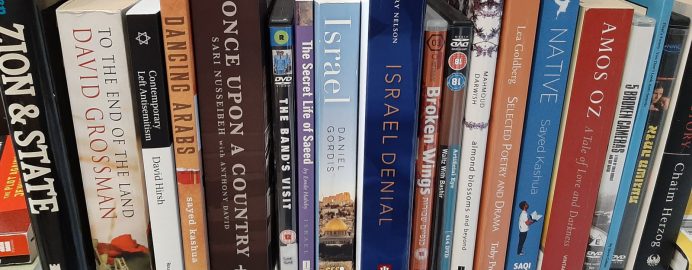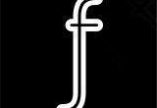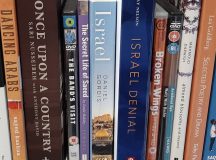Each week five Fathom writers will recommend Israel-related books, films or podcasts to help our readers through the lockdown. This week, the selections of John Strawson, Colin Shindler, Jane Ashworth, Michael Weiger and Lyn Julius. Read previous recommendations here, here, here, and here by following the links provided.
1. John Strawson recommends Matti Friedman’s Spies of No Country: Secret Lives at the Birth of Israel
This fine book changed my understanding of the role of Jews from the Arab world in the creation of the State of Israel. I had very much accepted the conventional view that Ashkenazi Jews had played a dominant, even exclusive, role in creating the state, symbolised by the political leadership of Ben-Gurion and the military heroism of the Palmach. This book is not only about the secret lives of Jews from the Arab world who worked in Mandate Palestine and other Arab countries to provide critical intelligence; it is also a secret history of Israel’s birth. It has significant implications for contemporary relations between Ashkenazi and Sephardic Israeli Jews.
In Friedman’s book, we are introduced to Gamliel Cohen, from Damascus, Isaac Shoshan from Aleppo, Havakuk Cohen from Yemen and Yakuba Cohen, from Jerusalem. Their exploits begin with gathering intelligence and carrying out acts of sabotage against Palestinian Arab political and strategic targets. They are then sent to neighboring Arab countries as the 1948 war approaches. The book has detailed accounts of operations on both sides of the border. These are dramatic passages. However, what is more thought-provoking is the decisive role played by Jews from the Arab world at such a crucial moment. This is all the more important given the problematic experience of Middle Eastern Jews in Israel, especially in the 10 years after 1948. Tom Segev’s recent biography of Ben-Gurion reminds us how fraught the situation was in those years.
Friedman offers a refreshing account of the Jews who were mista’arvim ‘ones who become like Arabs.’ The Jews from the Middle East constitute about 50 per cent of the Israeli Jewish population today and their role in Israel’s birth needs to be more generally recognised.
John Strawson is a law professor at the University of East London School of Law, where he teaches International law and Middle East Studies.
*
2. Colin Shindler recommends Susie Linfield’s The Lions’ Den: Zionism and the Left from Hannah Arendt to Noam Chomsky
This is one of the best books that I have read recently on this vexed subject. It is absorbing and intimate. The author traces the political and personal odysseys of eight seminal intellectuals and their approach to the Jewish question and the rise of Israel. All but one are Jewish – the exception being the fiercely principled Fred Halliday. Susie Linfield aptly entitles his contribution to our understanding as ‘The Journey of a 68er’. Other thinkers include Isaac Deutscher, Maxime Robinson, Arthur Koestler, I. F. Stone and Albert Memmi. It is an ideological ride through the upheavals of the twentieth century – how we got from then to now.
Colin Shindler is an Emeritus Professor at SOAS, University of London and founding chairman of the European Association of Israel Studies.
*
3. Jane Ashworth recommends Ian Serraillier’s The Silver Sword
I was profoundly indignant when the teacher hit me for reading The Silver Sword under the desk during Maths class. It was such an insult: the book was gripping and I knew reading was important to the development of 8-year-olds like me, even if the teacher didn’t.
The Silver Sword was published in America as Escape from Warsaw. Googling it today, it seems I was far from being the only kid who matured with that book. Written for 8-year olds, you can find many adults who say it changed their lives.
The Silver Sword begins in Warsaw in 1940. The Nazis separate the three Balicki kids from their parents. Their father is in a concentration camp. The story follows the children, and a streetwise urchin who joins them, on their unaccompanied walk to Switzerland where they eventual reunite with their parents. Ruth, who is 14, leads the pack. Along the way, they overcome TB, narks, treachery, enemy soldiers, state oppression, heroes and mortal danger: when they are hungry they steal food.
I’d never read anything like the Silver Sword. Enid Blyton’s Famous Five stories could get a bit scary, but you knew there was always somewhere safe to run to and good would always triumph in the end. In the Silver Sword there was none of that. These kids experienced real danger. Every possible support – family, order, justice and benevolent rule – was absent. The safest place was the Displaced Persons camp.
It is one to invite your children to read at the right moment. But maybe not in Maths class.
Jane Ashworth is a Labour councillor in Stoke and the co-founder of Engage, the anti-racist campaign against left antisemitism.
*
4. Michael Weiger recommends Amos Oz’s In the Land of Israel
Many books have sought to capture what it’s like to live in Israel and the Territories. From a Jewish perspective, no book before or since has come close to Amos Oz’s In the Land of Israel. The structure is simple. During 1982, Oz travelled throughout Israel including the West Bank, and interviewed Jews, Palestinian Citizens of Israel and Palestinians in the West Bank.
Oz gives voice to the different communities living in the region. The ultra-Orthodox, the founder old-timers, the Palestinians, the settlers and the everyday folk of Ashdod. All have concerns, dreams, grievances and visions of the future. Of course, the calm, rational and liberal voice of Oz permeates the book, but he makes every effort for each voice to be heard on its own terms. Clearly, the book is written from a liberal Zionist perspective and a Palestinian writer would frame the issues differently.
The chapter on Bet Shemesh is the heart of the book. Sitting among the children of immigrants from North Africa, he gives expression to their pain over discrimination and the patronising approach of the Ashkenazi founders and the shame of seeing their parents humiliated in the immigration process. This is why they voted for Menachem Begin in the 1977 ‘Mahapach’, the political upheaval that brought Likud to power after 29 years in opposition. While berating Oz, they plie him with coffee, cigarettes and sweets, urging him to speak and interrupting him simultaneously. It is among the most powerful and dramatic chapters ever written about tensions within (Jewish) Israel
Notwithstanding the decades that have passed, it astonishing how relevant the book remains. If someone tells you that they understand the Jewish/Zionist lens on Israel without having read this book, you should be deeply sceptical.
Michael Weiger helps NGOs think more deeply about strategy and fund-raising. He has lived in Israel, the USA and the UK and was most recently the Chief Executive of the UJIA. He has an MA in Contemporary Jewry from the Hebrew University.
*
5. Lyn Julius recommends Bari Weiss’s How to Fight anti-Semitism
There has been no shortage of books published in recent years about anti-Semitism – those by Anthony Julius, David Hirsh, Julia Neuberger and Dave Rich spring to mind – but ‘How to fight anti-Semitism’ was triggered by the latest, lethal manifestation of the virus – in the US. While little in it is new, this short primer is as concise as you can get.
Weiss is a journalist in her thirties. A book review editor for the Wall Street Journal, she now writes for the New York Times. With the Tree of Life massacre of 11 Jews by a far-right extremist in October 2018 – in her own synagogue, in her home town of Pittsburgh – far-right anti-Semitism became horribly personal.
Weiss covers the ‘three headed dragon’ of far-right, left and radical Islamist anti-Semitism. US Jews have two fears: being shot by white supremacists, and being made out to be them.
On the left, anti-semites seek to replace indigenous Jews with Palestinians and cast Jews as ‘handmaidens of white supremacy’.
Neat aphorisms abound: ‘Once anti-Semitism required Jews to mark themselves. Now progressive anti-Semitism requires them not to,’ she notes that the academic and social spaces where Jews feel welcome are shrinking fast. ‘Anti-Semites with PhDs are harder to fight, the ones who defend bigotry as enlightened thinking’.
Radical Islam is a hotbed of anti-Americanism, anti-modernity and anti-Zionism. Weiss castigates those who claim to be the biggest defenders of liberal values for failing to call out Islamist anti-semitism. She warns that the virus is now being imported into the West by millions of refugees from the Arab and Muslim world.
The one disappointment is the concluding chapter: Weiss’s prescription for fighting anti-Semitism. Pride in Jewish or American values or wearing a Star of David necklace are not going to be that useful. But the book does sound a wake-up call to one of the great challenges of our age.
Lyn Julius is co-founder of Harif, an association of Jews from the Middle East and North Africa in the UK. She is the author of Uprooted: How 3,000 years of Jewish Civilisation in the Arab World Vanished Overnight.


































